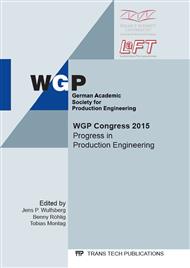[1]
J.M. Pearce, The case for open source appropriate technology, Environment, Development and Sustainability 14 (3) (2012), 425.
Google Scholar
[2]
H. -P. Götting, H. Röder-Hitschke, Grundlagen des Patentrechts in: M. Schulte (Ed. ), Handbuch des Technikrechts. Allgemeine Grundlagen, Umweltrecht, Gentechnikrecht, Energierecht, Telekommunikations- und Medienrecht, Patentrecht, Computerrecht, 2nd Ed., Springer, Berlin, 2011, 722.
DOI: 10.1007/978-3-642-11884-5_15
Google Scholar
[3]
M. Boldrin, D. K. Levine, Against intellectual monopoly, Cambridge University Press, New York, (2008).
Google Scholar
[4]
A. Powell, Democratizing Production through Open Source Knowledge: From Open Software to Open Hardware, Media Culture Society, 6 (34), (2012), pp.691-708.
DOI: 10.1177/0163443712449497
Google Scholar
[5]
T. Redlich, J. P. Wulfsberg, F. L. Bruhns, Open production: scientific foundation for co-creative product realisation, Prod Eng Res Devel 5(2), (2011), pp.127-139.
DOI: 10.1007/s11740-010-0286-6
Google Scholar
[6]
J. Ginger, R. McGrath, B. Barrett, V. McCreary, Mini Labs. Building Capacity for Innovation through a local FabLab Network, World Fab Conference (2012).
Google Scholar
[7]
T. Campbell, C. Williams, O. Ivanova, B. Garrett, Could 3D Printing Change the World, Atlantic Council, Strategic Foresight Report, October (2011).
Google Scholar
[8]
C. K. Prahalad, The Fortune at the Bottom of the Pyramid: Eradicating Poverty Through Profits, Revised and Updated 5th Anniversary Edition, Prentice Hall, (2011).
Google Scholar
[9]
T. Redlich, Wertschöpfung in der Bottom-up Ökonomie, Springer, Heidelberg, (2011).
Google Scholar
[10]
S. Michel, S. L. Vargo, R. F. Lusch, Reconfiguration of the Conceptual Landscape: A Tribute to the Service Logic of Richard Normann, Journal of the Academy of Marketing Science, 36 (2008), p.152–155.
DOI: 10.1007/s11747-007-0067-8
Google Scholar
[11]
G. von Krogh, Open-Source Software Development, MIT Sloan Management Review, (2003).
Google Scholar
[12]
J. Feller, B. Fitzgerald, Understanding open source software development, Addison-Wesley, London, (2002).
Google Scholar
[13]
A. Bonaccorsi, C. Rossi, Why open source software can succeed, Research Policy, 32 (2003), pp.1243-1258.
DOI: 10.1016/s0048-7333(03)00051-9
Google Scholar
[14]
B. Kogut, A. Metiu, Open-source software development and distributed innovation, Oxford Review of Economic Policy, 17 (2) (2001), pp.248-264.
DOI: 10.1093/oxrep/17.2.248
Google Scholar
[15]
RepRap project, information on: http: /reprap. org/, from 26 April (2015).
Google Scholar
[16]
MakerBot, information on: http: /de. wikipedia. org/wiki/MakerBot#cite_note-4, from 26 April (2015).
Google Scholar
[17]
Tesla Motors, information on: http: /www. teslamotors. com/blog/allour-patent-are-belong-you, from from 26 April (2015).
Google Scholar
[18]
Toyota, information on: http: /corporatenews. pressroom. toyota. com/releases/toyota+fu el+cell+patents+ces+2015. htm, from 26 April (2015).
Google Scholar
[19]
Local Motors, information on: http: /de. slideshare. net/johnbrogersjr/local-motors-johnrogers-maker-con-2014-140918?related=1, from 26 April (2015).
Google Scholar
[20]
Open Source Ecology, information on: http: /opensourceecology. org/, from 19 January (2015).
Google Scholar
[21]
C. C. Thomson, M. Jakubowski, Toward an Open Source Civilisation, Innovations, 7(3) (2012).
Google Scholar
[22]
M. Boldrin, D. K. Levine, The Case Against Intellectual Monopoly, FRB of St. Louis, Working Paper No. 2012-035A.
Google Scholar
[23]
M. Boldrin, D. K. Levine, Perfectly competitive innovation, Journal of Monetary Economics, (2008).
Google Scholar
[24]
N. Gershenfeld, Fab: The Coming Revolution on Your Desktop, From Personal Computers to Personal Fabrication, Basic Books, Cambridge, (2005).
Google Scholar
[25]
J. M. Pearce, C. M. Blair, K. J. Laciak, R. Andrews, 3-D printing of open source appropriate technologies for selfdirected sustainable development, Journal of Sustainable Development, 2(4) (2010).
DOI: 10.5539/jsd.v3n4p17
Google Scholar
[26]
C. Raasch, C. Herstatt, K. Balka, On the open design of tangible goods, Enkel, E., Gassmann, O., Chesbrough H. (eds. ): R&D Management - Special Issue: Open R&D and Open Innovation, 9(4) (2009), p.382–393.
DOI: 10.1111/j.1467-9310.2009.00567.x
Google Scholar
[27]
J. Ackermann, Toward Open Source Hardware, University of Dayton Law Review, 34 (2) (2009).
Google Scholar
[28]
B. Röhlig, Theory of Small Machine Tools: A Framework Approach to Machine Development, Adv. Materials Research, 769 (2013), pp.293-300.
DOI: 10.4028/www.scientific.net/amr.769.293
Google Scholar
[29]
J. P. Wulfsberg, B. Röhlig, Paradigm change: Small machine tools for small workpieces, Production Engineering, (2013).
DOI: 10.1007/s11740-013-0457-3
Google Scholar
[30]
J. P. Wulfsberg, A. Verl, K. H. Wurst, S. Grimske, C. Batke, T. Heinze, Modularity in small machine tools, Production Engineering, 7(5) (2013).
DOI: 10.1007/s11740-013-0464-4
Google Scholar
[31]
S. Grimske, Multifunktionale Schnittstellen für kleine modulare Werkzeugmaschinen, Hamburg, Dissertation Shaker Verlag, Band 34, (2014).
Google Scholar


